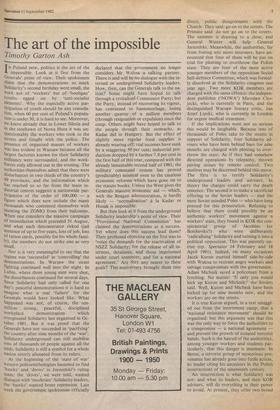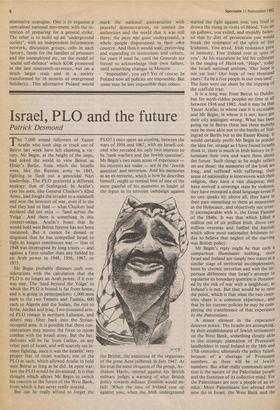The art of the impossible
Timothy Garton Ash
In Poland now, politics is the art of the impossible. Look at it first from the Generals' point of view. Their spokesmen Claim that the demonstrations to mark Solidarity's second birthday were small, the work not of 'workers' but of 'hooligan' Youths egged on by 'anti-socialist elements'. Why the especially active par- ticipation of youth should be any consola- tion, when 60 per cent of Poland's popula- tion is under 30, it is hard to see. Moreover, We know already that in Lower Silesia and In the steeltown of Nowa .Huta it was un- questionably the workers who took to the streets and fought with the police. The presence of organised masses of workers was less evident in Warsaw because all the largest factories known for their Solidarity militancy were surrounded, and the work- forces only allowed out in the evening. The authorities themselves admit that there were disturbances in two thirds of the country's 49 provinces, and the information which has reached us so far from the main in- dustrial centres suggests a nationwide par- ticipation of the order of 100,000 — a figure which does now include the many thousands who contented themselves with taunting the ZOMO from their balconies. When one considers the massive campaign of intimidation which preceded 31 August, and what each demonstrator risked (jail sentence of up to five years, loss of job, loss of ration cards, possibly for his whole fami- ly), the numbers do not strike one as very small.
Nor is it very meaningful to say that the regime was 'successful' in 'controlling' the demonstrations. In Warsaw the street fighting continued well into the night. In Lubin, where three young men were shot, the disturbances continued for several days. Since Solidarity had only called for one day's peaceful demonstrations it is hard to Imagine what a real 'failure' for the Generals would have looked like. What happened was not, of course, the ten- million strong, peaceful, disciplined workplace demonstration which overground Solidarity last organised in Oc- tober 1981. But it was proof that the Generals have not succeeded in 'pacifying' the country after nine months of the 'war'. Solidarity underground can still mobilise tens of thousands of people against all the odds. Solidarity is still a symbol for a whole nation utterly alienated from its rulers.
At the beginning of the 'state of war' western politornithologists hastened to find 'hawks' and 'doves' in Jaruzelski's ruling team: the 'doves', we were told, wanted dialogue with 'moderate' Solidarity leaders, the 'hawks' wanted brute repression. Last week the government spokesman officially declared that the government no longer considers Mr Walesa a talking partner. There is and will be no dialogue with the in- terned or underground Solidarity leaders. How, then, can the Generals talk to the na- tion? Some might have hoped to talk through a revitalised Communist Party; but the Party, instead of recovering its vigour, has continued to haemmorhage, losing another quarter of a million members (through resignation or expulsion) since the coup. Others might have hoped to talk to the people through their stomachs, as Kadar did in Hungary. But the effect of slightly more regular food supplies is already wearing off; real incomes have sunk by a staggering 50 per cent; industrial pro- duction dropped by a further 7.8 per cent in the first half of this year, compared with the already lamentable second half of 1981; the military command system has proved (predictably) inimical even to the cautious economic reforms which have gone on to the statute books. Unless the West gives the Generals massive economic aid — which, with the Reagan administration, is hardly likely — 'normalisation' a la Kadar or Husak is impossible.
But then look at it from the underground Solidarity leadership's point of view. Their `Provisional National Commission' has claimed the demonstrations as a success. Yet where does this success lead them? Their professed objective on the 31st was to `voice the demands for the reactivation of NSZZ Solidarity; for the release of all in- ternees, detainees, and those imprisoned under court sentences; and for a national agreement.' Are they any nearer to these goals? The' anniversary brought them into direct, public disagreement with the Church. They said: go on to the streets. The Primate said: do not go on to the streets. The summer is drawing to a close, and General Winter will help General Jaruzelski. Meanwhile, the authorities, far from freeing any more internees, have an- nounced that four of them will be put on trial for plotting to overthrow the Polish state. They are four of the most active younger members of the opposition Social Self-defence Committee, which was formal- ly dissolved at the Solidarity congress one year ago. Two more KOR members are charged with the same offence: the indepen- dent publisher (`NOWA') Miroslaw Cho- jecki, who is currently in Paris, and the distinguished Warsaw literary critic, Jan Jozef Lipski, who is currently in London for urgent medical treatment.
If the implications were not so serious this would be laughable. Because tens of thousands of Poles take to the streets in support of Solidarity, four Solidarity ad- visers who have been behind bars for nine months are charged with plotting to over- throw the state. As if they had somehow directed operations by telepathy, thrown paving stones by remote control. Two motives may be discerned behind this move. The first is to terrify Solidarity's underground leaders and advisers. In theory the charges could carry the death sentence. The second is to make a sacrificial offering to the Soviet leaders — and the most Soviet-minded Poles — who have long pressed for this prosecution. Refusing to believe that there could possibly be an authentic workers' movement against a workers' state, they found in KOR the con- spiratorial group of Jacobins (or Bolsheviks?) who were deliberately `radicalising' Solidarity and turning it into a political opposition. This was patently un- true (cp. Spectator 14 February and 18 April 1981). Indeed, on many occasions Jacek Kuron exerted himself side-by-side with Walesa to restrain angry workers and salvage compromises with the government. Adam Michnik saved a policeman from a lynching. No matter: 'If only you would lock up Kuron and Michnik!' the Soviets said. Well, Kuron and Michnik have been locked up for nine months now, and the workers are on the streets.
It is true Kuron argued, in a text smuggl- ed out from the internment camp, that a `national resistance movement' should be organised: but this argument was that this was the only way to force the authorities to a compromise — a national agreement and prevent the growth of isolated terrorist bands. Such is the hatred of the authorities, among younger workers and students par- ticularly, that this danger is imminent. In Berne, a terrorist group of mysterious pro- venance has already gone into futile action, its leader citing his ancestors in the Polish insurrections of the nineteenth century.
An insurrection is what Solidarity was not: and what its leaders, and their KOR advisers, will do everything in their power to avoid. At present, they offer two broad alternative strategies. One is to organise a centralised national movement with the in- tention of preparing for a general strike. The other is to build up an 'underground society', with an independent information network, discussion groups, cells in each factory, funds for the families of prisoners and the unemployed etc, on the model of `social self-defence' which KOR pioneered in the late nineteenth-seventies, but on a much larger scale and in a society transformed by 16 months of overground Solidarity. This alternative Poland would
mark the national anniversaries with peaceful demonstrations, to remind the authorities and the world that it was still there: the pays reel gone underground, a whole people dispossessed in their olfvn country. And then it would wait, preserving and expanding its institutions and culture, for years if need be, until the Generals are forced to acknowledge their own failure, until something changes in Moscow
`Impossible', you say? Yes of course. In Poland now all policies are impossible. But some may be less impossible than others.



































 Previous page
Previous page